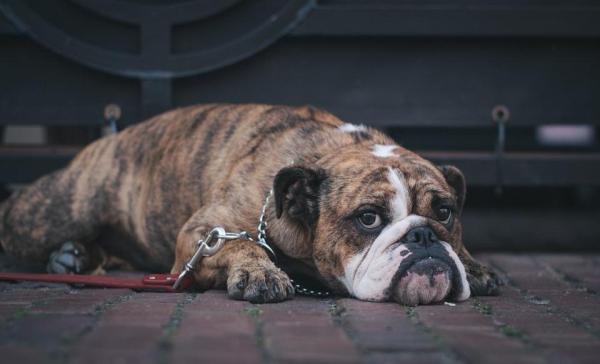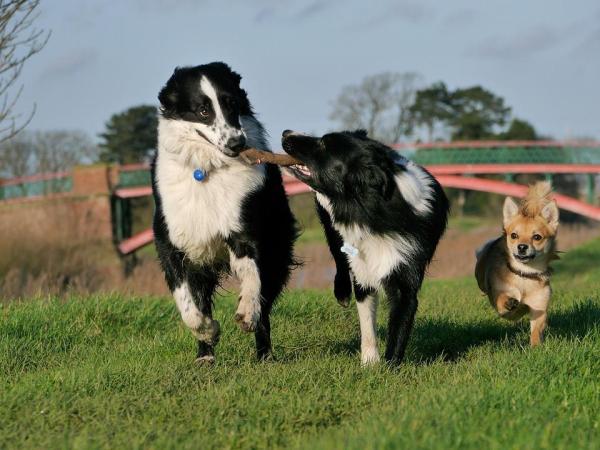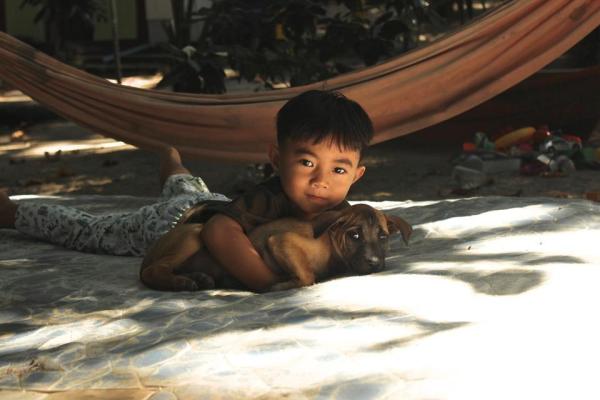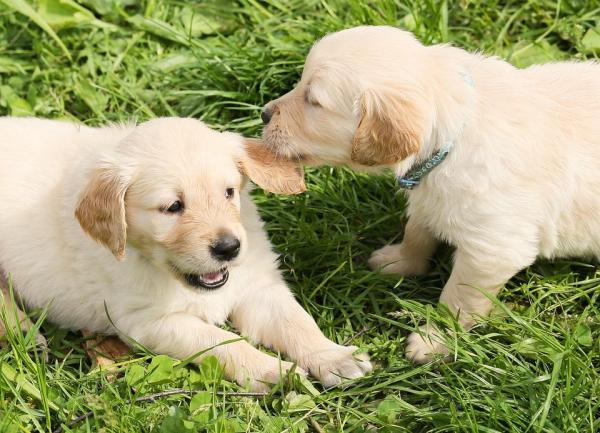
Dogs are generally very social animals who enjoy the company of other pets and people. However, a dog may become aggressive because of certain circumstances: this is a very serious behavioral problem that may jeopardize its safety and that of people. If your dog is aggressive with people, you should look for the cause and start working on it as soon as possible.
In this AnimalWised article we will show you what are the main causes of a dog's aggressiveness towards people and what are the possible solutions. Most dog attacks are suffered by young children and senior citizens, who are also the most vulnerable to such an attack. If you are wondering why is your dog aggressive with people and what can you do about it, read on.
Why is a dog aggressive?
Aggressive reactions in dogs may have many different causes. They can be a simple reaction to pain, such as when a child pulls on its tail, to the symptom of a disease like rabies or hypothyroidism.
More commonly, dogs become aggressive due to social or behavioral issues such as a tendency to dominance or a socialization process that has not been done properly.

Why can dominance lead to aggression?
Dogs are social animals that live in packs where there are relationships of dominance and submission. In other words, there is a hierarchy. The position of each dog in the pack is established by aggression, which most of the time does not generate serious injuries.
When a dog is welcomed into a home, it is necessary to establish a hierarchy. The dog must the last one in the group's ranks, and it is extremely important that it understands that children rank higher. When a dog believes itself to be above the children in pack hierarchy, it may attack them when they take one of its toys, come close to its space or reach for the dog's food.
You need to learn how to know if your dog is angry and identify its growls, since they indicate and point to a future aggression. Explaining this to the little ones is basic. However, aggression can also happen with other family members. We humans may want to treat everyone in our family equally, but from a dog's perspective there is a clear hierarchy within the home unit.

How should you socialize your dog?
The puppy's development has a socialization period or stage which takes place approximately between the 4th and 12th weeks of life. During this short period, the dog gets used to the surrounding environment and learns how to live in and relate to it. If your dog didn't have contact with other people during the socialization period, it will probably become fearful and aggressive as an adult.
When you adopt a dog, you should choose a puppy that's halfway through this period, that is, at about two months old. During the first socialization stage it will have learnt to socialize with other dogs by being with its mother and siblings; during the latter stage it will discover children, older people, noise, cars and all sorts of objects. If you don't take advantage of this learning stage, the dog will have a high probability of showing fear towards new experiences.
Here you can learn more about socializing puppies and adult dogs.

Are some breeds more aggressive than others?
The answer is yes, but we must not criminalize. Some dog breeds are considered potentially dangerous, but that's not because they are aggressive but because their bites are much more powerful. In fact, the most aggressive breeds are not as strong - consider the Cocker Spaniel or the Chow Chow, for instance.
In general, most attacks on people are caused by male dogs. The main reason why a dog is aggressive is not its breed, but bad training or an unsuitable environment. When raised in a violent or uncontrolled environment, dogs can become aggressive regardless of their breed.

Preventing a dog from becoming aggressive
First, you have to carefully choose a breed that suits your environment. If you choose a mixed-breed dog, take into account its ancestors and their tendencies if possible. For instance, if you live in a tiny urban apartment and adopt an Australian Shepherd, you'll probably suffer serious consequences in the future, as that breed requires plenty of physical and mental exercise and stimulation.
Secondly, make sure that the socialization process is adequate. Teach your dog the basic dog commands through positive reinforcement: it will take time and effort, but not doing so will cause hierarchy and obedience issues.
Finally, it is recommended to neuter all pets. Besides being an effective control against certain diseases and uncontrolled breeding, it is the first treatment used against aggressive dogs.

Tips to deal with an aggressive dogs
Once your dog is an adult it will be very difficult to modify certain habits; however, it is not impossible to do so. Before going to a professional dog trainer or ethologist you must ask yourself whether your lifestyle is right for your dog:
- Suitable walks: Walking with your dog at least an hour a day is essential for it to exercise, relieve stress and interact with the environment. Establish a clear routine and avoid the common things you do wrong when you walk your dog.
- Animal welfare: Review the five freedoms of animal welfare. Many owners believe that they are caring for their dog properly when in fact they aren't - make sure you meet animal welfare standards.
- Practice obedience: Even when the dog is an adult you can practice obedience training and achieve good results. Ensuring that the dog obeys you inside and outside the home is a very powerful tool for your safety and that of others.
- Do not force situations: Some people feel they must "take" their dog to other pets and people when the animal clearly indicates through growling and body language that it does not want to. If you do not respect the signals sent by your dog, it is very likely you will have an accident.
- Rewarding instead of scolding: Positive reinforcement achieves good results when compared to punishment. In addition, scolding a dog with obvious behavioral problems can cause much more serious situations. Instead of punishing it when it does something wrong, congratulate it whenever it behaves properly. Here you can learn the common mistakes you make when scolding a dog.

My dog is still aggressive: what do I do?
It would be necessary to consult with a veterinarian in case there is any underlying disease that causes pain or stress in your dog. Enlisting the help of canine trainers or ethologists is highly recommended: in practice, they are the only professionals who can try to remedy the situation.
As soon as you notice that your dog is aggressive with people, you must apply basic security measures such as using a leash and muzzle in public spaces.

If you want to read similar articles to Why is my Dog Aggressive with People? Causes and Solutions, we recommend you visit our Behavioral problems category.